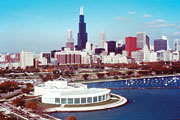
Maintaining these conditions in an indoor setting presents challenges. In 1997, the facilities team members at Chicago's John G. Shedd Aquarium decided they needed to upgrade the systems in the penguin exhibit area. The air-handling system it had at the time could hold the temperature to only ±10º F of the setpoint, which was too much of a variation for the penguins.
That changed later in the year when Shedd began installing new A/C units controlled by an Infinity system from Andover Controls. The target was to stabilize the environment by holding the temperature to within 5º of the setpoint. The Infinity system beat that goal - the penguins now enjoy temperatures within one-half of a degree of the setpoint. The result: they eat better, are healthier than ever, are back to their natural colors, and breed more.
That application and the many that followed were the idea of Bradley L. Popovich, Sr., Shedd's vice president of facilities services. Formerly a data center manager, Popovich brought with him a no-downtime, information technology-based approach to what previously was a manually controlled operation. Early in 1997 he selected the system, he said, because "We were impressed with the simplicity of the system and how we could write the code for it ourselves in an English-language script."
In Black and White
"An aquarium is not an office building," Popovich said. "Our application required a lot of processing, and we wanted to monitor a large number of alarm points. Animals can't talk to you, so if something goes wrong in their environment, we want to know it right away." Expandability is important as well. "We knew we would be doing other projects, and we wanted to be able to add on to the control system as quickly and easily as possible."After upgrading the environmental controls in the penguin exhibit, Popovich turned to other areas: maintaining the 2-million-gal marine mammal tank at a constant 50 degrees; keeping 750,000 gal of water in the Philippines exhibit at a tropical temperature; stabilizing the water temperature and humidity in the Amazon Rising exhibit at 80 degrees and 80%; and controlling the water temperature for sensitive seahorses to within one-tenth of a degree.
Despite the varied environments, aquarium visitors have to be comfortable, so the system keeps the air temperature in public areas at 70 degrees. It controls three chiller systems and heat exchangers, AHUs for private and public spaces, four boilers supplying five hot water zones, tank and ambient lighting, and the entire aquatic filtering and tank temperature control network.
The system showed its flexibility when Shedd expanded its facilities in 2000. To support the new exhibits there and add new capabilities, Popovich selected Andover's new controller family, Continuum(r). It monitors about 5,000 points throughout the facility - 2,000 of which are alarmed and 1,000 of which are critical - and can send an alarm to staff by pager and make that knowledge base available at the same time.
Defrosted Coils, Frosty Penguins
The system has helped significantly reduce Shedd's operating costs. For example, it enables Shedd to use outside air to cool the building and many of the tanks in the winter. Previously Shedd used three existing chiller plants to do this, an enormous power load. The Andover system has helped reduce wide variations in energy use, and resulted in a 26% reduction in energy consumption between 1996 and 2001, despite significant renovations and expansions over that time.Another example of the system's flexibility is the increased efficiency of the aquarium's AHUs. "When we're recreating winter weather for penguins, it's summer in Chicago, and the air conditioners' compressor coils would ice up," Popovich said. "Before we'd have to manually open the air handlers' doors and hose down the coils until the ice was gone. Now," he added, "if we get ice on the coils, the Andover system automatically shuts the compressor off, closes the dampers so warm air won't enter the exhibit, and sends warm water through the coils to defrost them. This takes just 15 or 20 minutes, and the animals never notice it because the temperature doesn't change." That, quite simply, makes for happy penguins.ES
